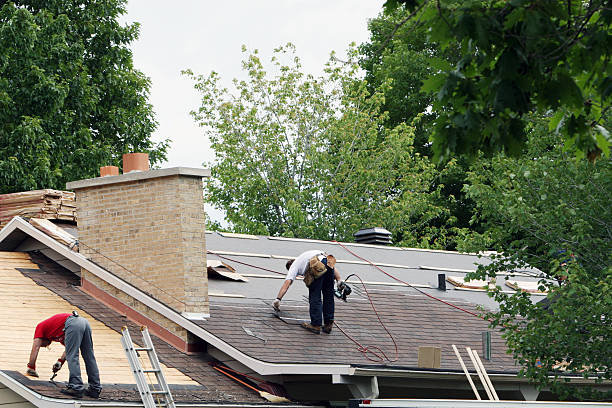Starting a roof project can feel overwhelming—especially if it’s your first time tackling such a significant part of your home’s structure. Whether you're repairing a small leak, replacing worn shingles, or installing an entirely new roof, it’s essential to understand the process, set expectations, and know what to look for in a roofing partner.

To help you make smart, informed decisions, here’s a comprehensive guide to everything you need to know before beginning your roof project.
1. Determine the Purpose and Scope of the Project
The first step in any roofing project is to identify the problem or objective. Are you dealing with water leaks? Has storm damage affected the roof’s integrity? Or are you simply looking to improve energy efficiency and curb appeal with a roof upgrade?
Once you've defined the goal, you can narrow down your options. Minor repairs may only require patching or replacing individual shingles, while long-term issues like sagging, rotting, or age-related wear may warrant a full roof replacement.
The scope will influence your budget, timeline, and whether you need to vacate your home during construction. It’s also essential to have a professional inspection to accurately assess the roof’s condition and avoid missing hidden issues.
2. Understand the Different Roofing Materials Available
There are many types of roofing materials, and each comes with unique pros, cons, and price points. Some of the most popular options include:
- Asphalt Shingles – Affordable, widely used, and easy to install
- Metal Roofing – Long-lasting, energy-efficient, and low-maintenance
- Tile or Slate – Highly durable but heavier and more expensive
- Wood Shakes – Attractive and traditional, but require regular maintenance
- Synthetic Roofing – Mimics other materials but is lighter and often less costly
Choosing the right material depends on your climate, budget, aesthetic preferences, and long-term maintenance expectations. A reputable contractor offering roofing services can walk you through these options and help determine the best fit for your home and location.
3. Budget Carefully and Plan for the Unexpected
A roof project is a major financial investment, and while you might have a budget in mind, it’s important to account for hidden or unexpected costs. These may include:
- Structural repairs beneath the roof deck
- Upgrades to meet current building codes
- Permit fees
- Waste disposal
- Labor and material fluctuations
Getting a detailed written estimate from your contractor is key. This estimate should clearly list material types, quantities, labor costs, and a contingency plan for unexpected issues. Avoid verbal quotes or vague proposals—they can lead to cost overruns and disputes.
4. Choose the Right Contractor
One of the most critical decisions you’ll make is selecting the company that will handle your roof project. While you may be tempted to search for a roofing company near me and pick the first result, it pays to do a little homework.
Here are a few essential factors to look for:
- License and Insurance – Make sure the company is fully licensed in your state and carries liability and worker’s compensation insurance.
- Local Reputation – Check online reviews, ratings, and references. Local contractors are more familiar with regional weather patterns and building codes.
- Experience and Certifications – Look for certifications from major roofing manufacturers, which often reflect a higher level of training and reliability.
- Warranty Offerings – A trustworthy company should offer warranties on both materials and workmanship.
A good contractor will also take time to explain the process, answer your questions, and keep you informed throughout the project.

5. Review the Project Timeline and Permits
Before work begins, you should have a clear understanding of the project timeline. Ask your contractor about:
- Start and end dates
- Potential weather delays
- Daily work hours
- Cleanup procedures
In many areas, roofing projects require permits or inspections from the local building department. Your contractor should handle this as part of the service, but it’s wise to confirm in advance to avoid any legal or regulatory headaches.
6. Protect Your Home During Construction
Roofing is messy, noisy, and sometimes invasive. Protecting your home, garden, and personal belongings is essential. Steps you can take include:
- Removing valuables from attics or top floors
- Covering landscaping and outdoor furniture
- Ensuring pets and children stay safe and away from work zones
- Informing neighbors of the upcoming work
Additionally, ask your contractor about their cleanup policy. Quality roofers will use tarps and magnetic sweepers to collect nails and debris from your property at the end of each day.
7. Know What Happens After the Job is Done
Once the work is complete, don’t just rely on a visual inspection from the ground. Request a final walk-through with your contractor and review all completed work in detail. Ask for documentation, including:
- Final invoice and payment receipts
- Warranty paperwork
- Photos of completed work
- Maintenance tips and recommendations
Even after the project ends, regular roof maintenance is key to preserving your investment. Keep gutters clean, schedule periodic inspections, and address small issues before they become bigger problems.
Conclusion
A roof project is no small undertaking, but with the right preparation and the right contractor, it can be a smooth and rewarding experience. From material selection and budgeting to contractor choice and cleanup, every decision plays a role in the success of your project.
Whether you're exploring full replacement or simple repairs, professional roofing services ensure that your home is protected and your investment is worthwhile. And while it’s easy to just search for a roofing company near me, it’s your due diligence that ultimately guarantees quality results. Take the time to plan ahead—and your roof will reward you for decades to come.